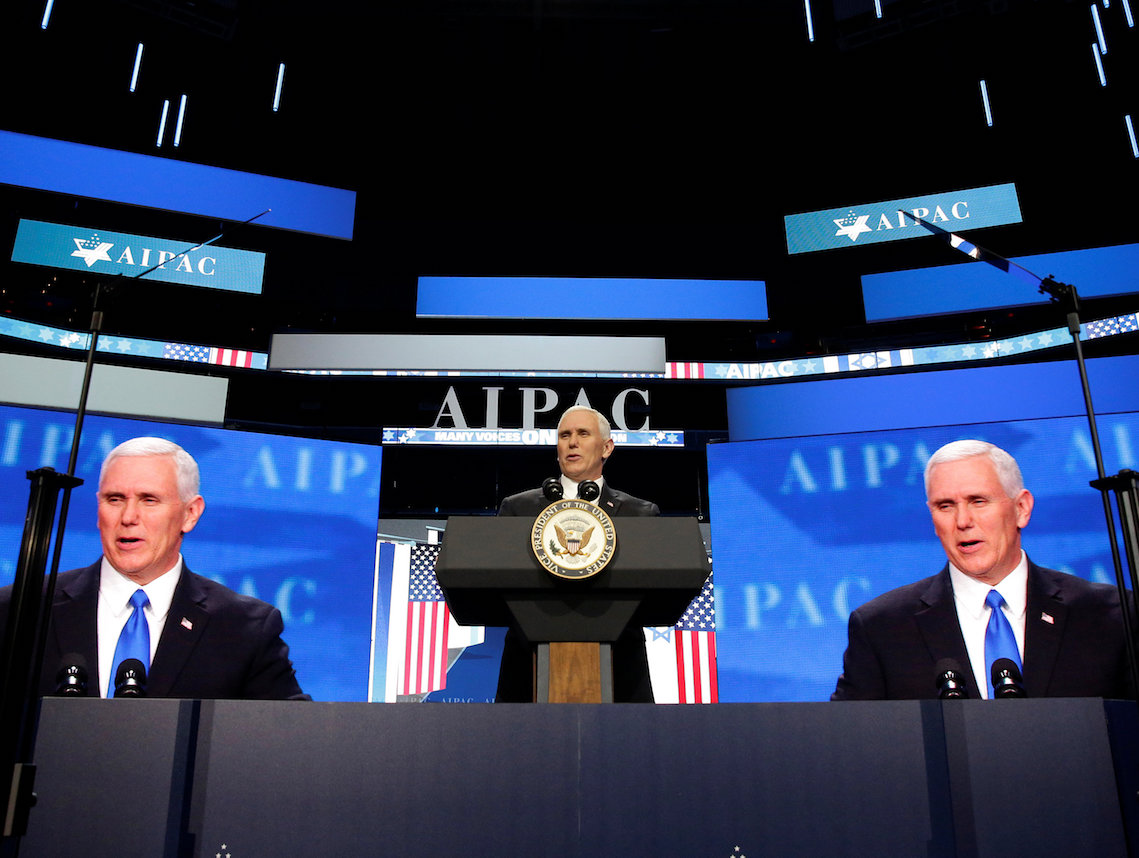 U.S. Vice President Mike Pence speaks at the American Israel Public Affairs Committee (AIPAC) policy conference in Washington, U.S., March 26. Photo by Joshua Roberts/REUTERS.
U.S. Vice President Mike Pence speaks at the American Israel Public Affairs Committee (AIPAC) policy conference in Washington, U.S., March 26. Photo by Joshua Roberts/REUTERS. 1.
This was the least eventful AIPAC conference I remember, and I’ve been to many AIPAC conferences. It looked uneventful almost by design. The US President, a man of many talents – among which the talent to make headlines – did not attend. His VP visited Israel not long ago and had nothing much to add. Nikki Haley is a rock star, but let’s be honest: vilifying the UN at Aipac is an easy job. And then there is Prime Minister Netanyahu. He made headlines, but not here in Washington. If Israel goes to election soon, if Netanyahu is going to be indicted soon, these will all be post-Aipac events.
2.
So, no major headlines were coming out of Aipac – is that good or bad?
On the one hand, it could reinforce the notion, shared by even some of the participants, that Aipac’s stage is not as important as it used to be in years past.
On the other hand, it could reinforce the message that Aipac clearly aimed to send this year: we are truly bipartisan, we are truly a place where a discussion can take place among people who have different views and still share a goal, or a love of Israel.
An uneventful political event in Trump’s America. Maybe that’s the headline. Maybe that’s what makes it unique.
3.
From several conversations I had, I get the impression that the appeal to progressives in this conference was quite successful. It felt like a real attempt at inclusion, and at least some of the progressive participants were convinced that Aipac is genuine in trying to send a message of a broad tent. Of course, such message has benefit and a cost. It might result in a toning down, or even a watering down, the way Aipac deals with policy and legislation. It might result in enlarging the camp of people that are willing to identify with the organization and its goals.
4.
The appeal to progressives also impacts the relations with Israel – and its quite conservative ruling coalition. Expressing fervent support for a two state solution is essential as you appeal to American progressives. But it will make certain Israelis wonder about Aipac’s priorities: Is it to support Israel, or to appeal to Americans who find it difficult to support Israel? For the time being, this question is not an urgent one, because no major conflict concerning negotiations with the Palestinians is on the horizon. But it still has the potential to become a thorny complication is Aipac’s way forward.
5.
Earlier this week I wrote (in JJ’s Daily Roundtable – I assume you already subscribed to it) that in addition to the obvious reasons – Iran, Palestinians, Syria and Russia – Netanyahu came to Washington carrying two messages to his domestic audience. These messages are linked but are not exactly the same.
One – I am still functioning, and not too distracted by the ongoing investigations to be effective as a leader.
Two – I am indispensable. No Israeli has such standings in America and the world, no one can replace me and have similar success.
Did he succeed in carrying this message? I’d argue that he was upstaged by well timed events at home: a political crisis that could end his term, and the signing of yet another state witness against him. Since his meeting with Trump, and his Aipac speech did not result in a dramatic headline – his trip was not a huge domestic success.
6.
I also wrote that yes, there’s a political angle, as we all understand, but that gossipy cynicism aside, Netanyahu’s plate of issues for this visit includes more than just domestic considerations. If a decision on the Iran nuclear agreement is about to take place, it better be coordinated. If a policy on the future of Syria is something the US is mulling, Israel’s input must be taken into account.
Two days ago, the NYT describes an “American strategic void” in response to Russia’s recent moves. This void worries Israel, and can be of great consequence for its security. Thus, the challenge for Netanyahu was a tricky one: to alert Trump to the need for a more robust US policy, without being seen as too critical or too pushy, as not to disrupt the good rapport between these two leaders.
7.
Were you listening to PM Netanyahu’s speech? It was the sunniest I remember him ever giving. It this Bibi? Or maybe Shimon Peres’s ghost just came back to haunt us? The threats took a backseat to the opportunities. The bad news – there were bad news – took a backseat to the good news. I wonder if this was Bibi’s way to accommodate Aipac’s message to the delegates – or maybe his way to surprise, to keep the delegates awake – what the routine speech on the threat of Iran can no longer do.
One way or the other, it was a change for the better.
A note to readers: I was invited to speak at Aipac’s 2018 policy conference, and was happy to accept the invitation. My travel expenses were paid by the organization.





















 More news and opinions than at a Shabbat dinner, right in your inbox.
More news and opinions than at a Shabbat dinner, right in your inbox.